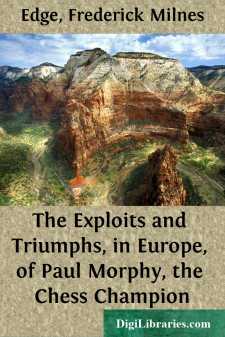Categories
- Antiques & Collectibles 13
- Architecture 36
- Art 48
- Bibles 22
- Biography & Autobiography 813
- Body, Mind & Spirit 142
- Business & Economics 28
- Children's Books 14
- Children's Fiction 11
- Computers 4
- Cooking 94
- Crafts & Hobbies 4
- Drama 346
- Education 46
- Family & Relationships 57
- Fiction 11829
- Games 19
- Gardening 17
- Health & Fitness 34
- History 1377
- House & Home 1
- Humor 147
- Juvenile Fiction 1873
- Juvenile Nonfiction 202
- Language Arts & Disciplines 88
- Law 16
- Literary Collections 686
- Literary Criticism 179
- Mathematics 13
- Medical 41
- Music 40
- Nature 179
- Non-Classifiable 1768
- Performing Arts 7
- Periodicals 1453
- Philosophy 64
- Photography 2
- Poetry 896
- Political Science 203
- Psychology 42
- Reference 154
- Religion 513
- Science 126
- Self-Help 84
- Social Science 81
- Sports & Recreation 34
- Study Aids 3
- Technology & Engineering 59
- Transportation 23
- Travel 463
- True Crime 29
The Exploits and Triumphs, in Europe, of Paul Morphy, the Chess Champion
Description:
Excerpt
Paul Morphy's father, Judge Morphy, of the Supreme Court of Louisiana, beguiled his leisure hours with the fascinations of Chess, and, finding a precocious aptitude for the game in his son, he taught him the moves and the value of the various pieces. In the language of somebody,—
"To teach the young Paul chess,His leisure he'd employ;
Until, at last, the old man
Was beaten by the boy."
I have here spoilt a very pretty story. The report in chess circles is, that the young Paul learned the moves from seeing his father play with his uncle, Mr. Ernest Morphy, long ranking amongst the first players in the Union, and one of the brightest living ornaments of American chess. One evening—so runs the tale—this gentleman awaited the arrival of the Judge, when Master Paul impudently offered to be his antagonist. What was the uncle's astonishment at finding the stripling a match for his deepest combinations, and what the father's surprise on discovering a very Philidor in his son of ten years! Deschapelles became a first-rate player in three days, at the age of something like thirty. Nobody ever believed the statement, not even Deschapelles himself, although his biographer declares he had told the lie so often that he at last forgot the facts of the case. But the story about Morphy beats the Deschapelles story in the proportion of thirty to ten. I sorrowfully confess that my hero's unromantic regard for truth makes him characterize the above statement as a humbug and an impossibility.
Paul's genius for Chess was, very properly, not permitted to interfere with his educational pursuits. At college (in South Carolina) until eighteen years of age, he had but little time for indulgence in his favorite game, nor did he find any one capable of contending with him. When the vacations allowed of his playing against such adepts as his father and uncle, or such well-known paladins as Mr. Ernest Rousseau, of New Orleans, and Judge Meek, of Alabama, he soon showed himself superior to all antagonists. In the autumn of 1849, Herr Löwenthal, the celebrated Hungarian player, visited the Crescent City, and out of three games against the young Paul, then but twelve years old, he lost two and drew one. It is but reasonable to suppose that the desire of atoning for this defeat had something to do with Herr Löwenthal's challenging his youthful victor, on his arrival last year in Europe.
CHAPTER II.
THE FIRST AMERICAN CHESS CONGRESS.
A circular was issued by the New York Chess Club, in the month of April, 1857, "for the purpose of ascertaining the feasibility and propriety of a general assemblage of the chess players resident in America." This "met with a hearty and zealous response from the amateurs and clubs of the United States. So favorable was the feeling everywhere manifested, that it was deemed advisable to proceed with the undertaking, and to complete at once the preliminary arrangements." In consideration of the movement having been initiated by the New York Chess Club, it was conceded that the meeting should take place in that city.
Some of the founders of the New York Chess Club still live to do honor to the game. I believe that Mr. James Thompson and Colonel Mead suckled the bantling in times of yore, sometimes forming the entire of the Club without assistance....


